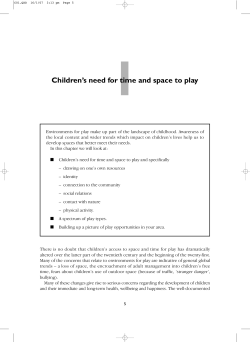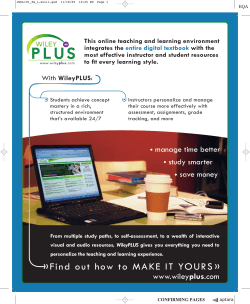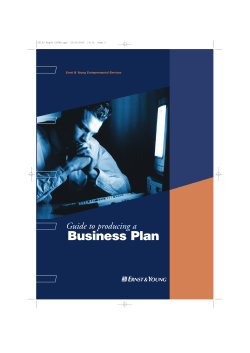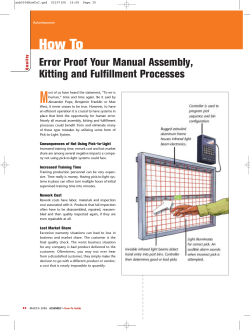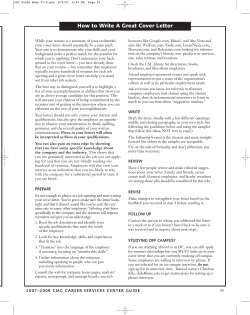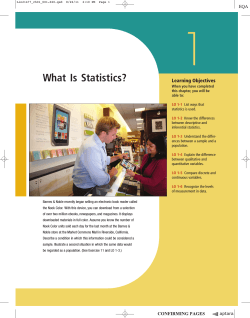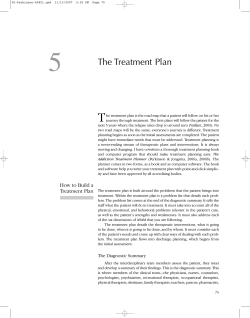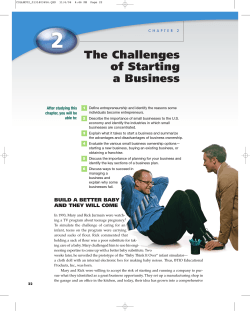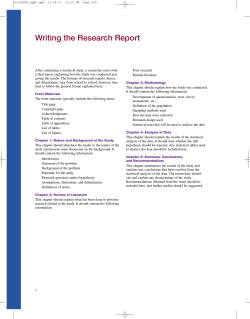
Start & Run an Event Planning Business Cindy Lemaire and Mardi Foster-Walker
Prelim.qxd 04/03/2005 8:46 AM Page iii Start & Run an Event Planning Business Cindy Lemaire and Mardi Foster-Walker Self-Counsel Press (a division of) International Self-Counsel Press Ltd. USA Canada Contents.qxd 3/10/2005 1:09 PM Page v Contents Introduction 1 1 Getting Started 5 Self-Assessment 5 Determining Your Market 6 Market Research 8 Set a realistic time limit 9 Define your information needs 9 Allocate resources 10 Gather the data 10 The internet 11 Your local library 11 The Yellow Pages 11 Chamber of commerce 11 College or university business departments 11 Government departments 12 The face-to-face meeting 12 Analyze the information 14 v Contents.qxd 04/03/2005 8:47 AM Page vi 2 Establishing Your Business Site 17 Location Considerations 17 Leasing Office or Studio Space 17 Proximity and accessibility to potential clients 18 Parking facilities 18 Accessibility to a loading dock or freight elevator 18 Work space and storage 18 Type of lease agreement 19 Home-Based Operation 3 The business and your home 20 The business and your family 22 Business Resources and Equipment 23 Business Resources 23 Mailbox and copy services 23 Business telephone line and fax line 24 Telephone and wireless communication options 25 Hands-free/speakerphone 25 Cellular or mobile phone 25 Hand-held wireless device or PDA 26 Voice over internet protocol 26 Courier company 26 Company vehicle 27 Office Equipment and Setup 27 Electronic Equipment 28 Computer and printer 28 Software for the events business 29 Facsimile machine 30 Digital camera and scanner 31 Other equipment 31 Office Supplies vi 19 Start & run an event planning business 31 Custom printing 31 General office supplies 32 Contents.qxd 04/03/2005 4 8:47 AM Page vii Financial Planning and Management 35 Financing Your Venture 35 Personal savings 36 Family and friends 36 Financial institutions 36 Private investors 37 Government 38 Your Business Plan 39 Executive summary 39 Personal experience and background 40 Description of service 40 Sales and marketing strategy 40 Forecasts and projections 40 Financial Management 5 6 41 Forecasting cash flow 42 Fixed expenses and overhead 42 Marketing costs 42 Start-up costs 46 Forecasting revenues 46 Pricing Your Services 51 Competitive Pricing 51 Hourly Fee and Daily Rates 52 Cost-Plus Pricing 52 Flat Fee 53 Commission 53 Discounting 54 Fund-raiser events 54 Suppliers 54 Client and Supplier Contracts: Protecting Your Business 55 Supplier Contracts 56 Client Contracts 56 Contract Finalization 57 Contents vii Contents.qxd 04/03/2005 8:47 AM Page viii 7 Keeping Your Operations in Order 59 Striking a Balance 59 Maintaining Financial Records 59 Set up a calendar and reminder system 60 Establish an efficient filing system 60 Keep track of deposits 61 Keep track of retainers 61 Keep invoicing on track 61 Establish regular billing, credit, and collection 62 Keep good tax records 62 Hire a professional bookkeeper and accountant 62 Keeping Your Non-Financial Records in Order 8 Personnel records 64 Research files 64 Managing Your Time 64 Long-term agenda 65 Intermediate agenda 65 Immediate agenda 65 Time-management systems 66 Social Functions, Associations, and Community Events 66 Staying Organized As You Grow 67 Marketing, Advertising, and Promotion 69 The Changing Face of Advertising 69 How to Brand Your Event Planning Business 70 Developing your image 71 Developing your brand promise 71 Naming your new business 72 Designing your logo 73 Professional Design and Production Services viii 64 Start & run an event planning business 73 Graphic design 74 Copywriting 75 Photography 75 Contents.qxd 04/03/2005 8:47 AM Page ix Why You Should Advertise 76 The Elements of Advertising 76 Choosing Your Advertising Medium 77 Print 77 Direct mail 78 Directories 79 Sales brochure and marketing kit 80 Internet marketing 82 A company website 82 E-mail marketing 84 Using PR to Your Business Advantage Special promotions 9 84 84 Open house or grand opening 85 Small giveaways 85 Fairs and trade shows 85 Getting your name in the news 85 Socializing for success 86 Networking, networking, networking 89 Association memberships 89 Tourism, convention, or visitors’ bureau 90 Board of trade or chamber of commerce 90 Meeting professionals international 90 Special events societies 91 Measuring Advertising Effectiveness 91 Employees and Personnel 93 Being a Sole Owner/Operator 93 Casual Labor and Seasonal Helpers 95 Where to look for extra hands 95 Know your legal responsibilities 96 Put details in writing 96 Hiring an Assistant 98 Hiring an Office Manager/Bookkeeper 99 Contents ix Contents.qxd 04/03/2005 8:47 AM Page x Hiring and Keeping Good Employees Commonsense guidelines to hiring employees 101 Do not hire friends or relatives 102 Ask for recommendations 102 Contact job placement departments 102 Advertise for help 102 Use job application forms 102 Check references 103 Commonsense guidelines to keeping good employees 103 Communication 103 Consistency 103 Recognition 103 Compensation 104 Evaluation 104 Commissions and share options 104 10 Making the Business Legal Your Legal Structure x 100 107 107 Sole proprietorship 107 Partnership 108 Limited partnerships 108 Incorporation 108 Leave It to the Professionals 110 Choosing Your Name — Legally 111 Insurance Requirements 112 Leases and Rental Agreements 113 Zoning Laws and Business Licenses 115 Zoning laws 115 Licenses 115 Sales Taxes 116 Employee-Related Regulations 116 Miscellaneous Permits 117 A Final Word 117 Start & run an event planning business Contents.qxd 04/03/2005 8:47 AM Page xi 11 Accounting, Record Keeping, and Taxes 119 Accounting Software 120 Bookkeeping 121 Accounts Receivable 122 Accounts Payable 124 Petty cash 124 COD and cash purchases 124 Payable invoices 125 Company credit cards 125 Personally paid company expenses 126 Payroll 126 Inventory 127 Maximizing Deductible Expenses 127 Accountants 128 12 Developing Your Portfolio 131 Building Your First Portfolio 131 Maintaining a Professional Portfolio 132 Types of Portfolios 133 Presenting Your Portfolio 133 13 The Event Planning Process 135 The Event Plan 135 Background Information 136 Goals and Objectives 137 Agenda 139 Venue 139 Budget 141 Critical Path 145 Audience 147 Invitations 147 Registration 148 Transportation and accommodation 148 Partners/Kids 148 Contents xi Contents.qxd 04/03/2005 8:47 AM Page xii Speakers 148 Takeaways 149 Partners and Sponsors Volunteers 150 Media 150 Sponsors 151 Marketing 151 Suppliers 152 Insurance and Permits 153 Contingency Planning 153 Follow-up 155 14 Working with Suppliers 157 Finding Suppliers and Vendors 157 Negotiating with Suppliers 159 Tips for Dealing with Regular Suppliers 160 The venue 161 Hotel accommodations 161 Food and beverage 162 Printing and signage 162 Audiovisual 163 Photography 163 Entertainment 165 Children’s parties 165 Live and canned music 165 Official guests, speakers, and celebrities 166 Speakers 166 Celebrities 167 15 The RFP: Getting the Business Defining the Bidding Process Invitation to quote (ITQ) Start & run an event planning business 166 Official guests Keeping Suppliers and Vendors Happy xii 149 167 169 169 170 Contents.qxd 04/03/2005 8:47 AM Page xiii Request for proposals (RFP) 170 Request for qualifications (RFQ) 170 Competing for an RFP 171 The Basics of an RFP 171 Preparing Your Response 172 Developing Your Sample Event 173 Meeting the Budget 174 Looks Count: Presentation of Your Response 174 Presenting with Polish 175 Following Up 176 16 Award-Winning Events Fashion Cares 2003 — Viva Glam Casino 177 178 Theme 180 Sponsorship 180 Cocktail reception 180 Dining room 180 Boutique, silent auction, casino 181 Talent 181 Fashion show 181 VIP Lounge 181 After-party 182 Media 182 Budget 182 Co-ordination 182 John “Q” Movie Premiere 182 Cirque Pacifique 185 Malavalli/Patel Wedding 187 Christmas through the Eyes of a Child 189 Last Tango in Paris 191 More Award-Winning Events 192 17 A Final Word: Growing and Enjoying Your Business 193 Contents xiii Contents.qxd 04/03/2005 8:47 AM Page xiv Appendix 195 Glossary 201 Samples 1 Business start-up costs 33 2 Overhead and fixed expenses 43 3 Contract checklist: Safeguarding your business 58 4 Invoice 63 5 Press release 87 6 Media advisory 88 7 Advertising and promotions expense breakdown 92 8 Job description 97 9 Balance sheet 123 Worksheets xiv 1 Self-assessment test 2 Business expenses 44 3 Marketing expenses 45 4 Start-up expenses 47 5 Montly revenue forecast 48 6 Event budget Start & run an event planning business 7 142 Chap01.qxd 04/03/2005 8:50 AM Page 5 1 Getting Started Self-Assessment What is it that makes one person succeed in the events industry while another fails? There is no one stereotype of a successful special events entrepreneur, but certain common characteristics can be found in those who succeed. For example, they are invariably hardworking, determined, resourceful, and capable of honest selfappraisal. Starting your own special events business is risky, and you need to be clear on whether it is the best choice for you. You may already be working in the special events industry, but turning your skill into a business is a very different venture. Examining both your strengths and your weaknesses gives you the chance to remedy the factors that may impede your success. If you don’t manage time well, don’t like to work alone, and dislike making decisions, starting your own events business may not be appropriate — unless you are willing to work on your shortcomings. You don’t have to be perfect, but you do need to recognize and acknowledge your strengths and weaknesses before investing time and money in a business. 5 Chap01.qxd 04/03/2005 8:50 AM Page 6 To aid you in your self-analysis, a self-assessment test is provided here for your use (see Worksheet 1). It outlines some characteristics for success in this field and asks you to evaluate yourself against them. Answer the questions honestly to determine how many success characteristics you already have. This test will not definitively tell you what you should do, but it can help you engage in honest self-appraisal. A passion to succeed, an eagerness to learn, and an acceptance of responsibility can overcome any weaknesses. The value of any quiz, test, or questionnaire lies in that it can help you identify your strengths and admit your weaknesses. Look on this self-appraisal as an important first step in your journey to starting and running a successful special events business. You are capable of capitalizing on your strengths and compensating for your weaknesses as long as you know what they are and if your desire to do so is powerful enough. Once you have determined that starting a special events business is the right venture for you, take some time to test your ability to create special events. If you have not created events before, we recommend that you create on paper two or three theme events. Organize them in a portfolio with sketches, photos, fabric swatches, menus, rental details, production schedules, and budgets. Use this portfolio of event ideas when doing your market research by showing them to family and friends. Determining Your Market Once you have decided on whether or not this field is right for you, your next step is to determine your market or area of specialty. Is there a big enough market waiting to hire you to produce their special events? Make certain you discover this before you risk time and money on starting a business. Many start-up operations are established solely on instinct and optimism. The enthusiastic new business owner may have only a vague idea about who his or her clients are or, indeed, whether or not there will be any clients at all. Operating on blind faith, such people are relying on plain old luck to see them through, and sometimes, it takes just that. However, while every business needs a little luck now and then, banking on it is hazardous to the long-term health of your enterprise. The special events industry is so vast that the event organizer is not limited to just one market segment. Even those who are experts 6 Start & run an event planning business Chap01.qxd 04/03/2005 8:50 AM Page 7 WORKSHEET 1 SELF-ASSESSMENT TEST Check the appropriate column for each of the following statements. (N = never; M = most of the time; A = always) N 1. I am a self-starter. ________ 2. I am normally positive and optimistic. ________ 3. I easily accept personal responsibility. ________ 4. I have no problem working alone. ________ 5. I am competitive. ________ 6. I commit strongly. ________ 7. I am flexible. ________ 8. I am self-confident. ________ 9. I relate well to other people. ________ 10. I am a goal setter. ________ 11. I am a creative problem solver. ________ 12. I like to plan. ________ 13. I am a decision maker. ________ 14. I enjoy working hard. ________ 15. I can tolerate risk. ________ 16. I seldom procrastinate. ________ 17. I am innovative. ________ 18. I handle stress well. ________ 19. I am independent by nature. ________ 20. I am a logical thinker. ________ 21. I am persistent. ________ 22. I communicate well with others. ________ 23. I manage my time well. ________ 24. I have plenty of common sense. ________ 25. I have the ability to think objectively. ________ 26. I am in good health. ________ 27. I like to learn new things. ________ 28. I am realistic. ________ 29. I can take criticism. ________ 30. I am ambitious. ________ M ________ ________ ________ ________ ________ ________ ________ ________ ________ ________ ________ ________ ________ ________ ________ ________ ________ ________ ________ ________ ________ ________ ________ ________ ________ ________ ________ ________ ________ ________ A ________ ________ ________ ________ ________ ________ ________ ________ ________ ________ ________ ________ ________ ________ ________ ________ ________ ________ ________ ________ ________ ________ ________ ________ ________ ________ ________ ________ ________ ________ Now determine your score. Should you start your own business? Count your Always and Most of the time answers as positive. If you scored 30 out of 30 You should be running General Motors. 26 – 29 You’ve got what it takes. 21 – 25 You’ll do just fine. 16 – 20 Be sure you answered yes to number 14 and 27. 15 Questionable. Under 15 Unlikely, but nothing is impossible. Getting started 7 Chap01.qxd 04/03/2005 8:50 AM Page 8 in the events business will have a difficult time trying to define all the potential markets. But to be successful in a field that is so broad, you need to find your niche — a specialty that combines your best capabilities with a service that is necessary and, preferably, underserved in your area. As outlined in the introduction, the choices are plentiful: conferences, conventions, incentives, corporate meetings, expositions, trade shows, fund-raisers, weddings, sporting events, concerts, festivals, parades, children’s events, golf tournaments, and the list goes on. When you concentrate on one market, referrals and word-of-mouth businesses come your way much more quickly. On the flip side, when you work in different fields and functions, you reduce your chances to become known as the best in the business. Where do you see yourself? What makes sense to you and the community you plan to serve? You may need some experience to gain this insight, but what’s important is to keep your options open and remember that you cannot succeed if you spread your special events business too thin. The key to your success is to identify your potential customers, to know what they want, and to determine how to fill that need. Market Research Your market is that segment of the population that could potentially use your service. Finding out who they are and what they want is called market research. This research will provide you with the data you need to help identify your potential clients and determine how to reach them. Conducting thorough market research is the foundation of any successful business. First, you must research your competition. Any special events company that is doing serious business will be advertised in the Yellow Pages and will likely have a website. Spend time looking at your competitors’ websites and studying their printed materials. This should give you a good idea of who the major players in the marketplace are and the type of competition you are up against. Remember that these people may be your competitors now, but there is a good possibility that they will become your future colleagues — people who will refer clients to you and people with whom you may associate professionally to share information on growing your businesses. It is not in your best interest to pretend to 8 Start & run an event planning business Chap01.qxd 04/03/2005 8:50 AM Page 9 be a customer and waste another event professional’s time asking for quotes or ideas. This type of behavior can return to haunt you. Competition is not a deterrent to going into business. However, it is important to know who your competitors are and where they are located so that you are on an equal footing. Knowing your competition allows you to learn from them. What do they do right? What do they do wrong? How will you be better? Market research helps confirm market size, minimize financial risk, save time, and pinpoint where you should concentrate your service. Researching your market can also uncover market segments that you may not have originally considered. It establishes a foundation for decision-making and positioning your service. However, not taking the time to do some basic market research can cause you to fail when you might otherwise have succeeded. The steps in basic market research are outlined here. Set a realistic time limit Decide how much time you intend to devote to market research and stick to that time limit. Think in terms of normal working days and eliminate weekends. Do not become so caught up in doing research that it takes precedence over getting the business started. Define your information needs What do you need to know? By properly defining your needs, you can save valuable time and avoid having to cope with too much information. To give your special events business a realistic chance of success, and to have the information necessary to write a comprehensive business plan, you must define what data is relevant for your proposed business. When you are starting out, you should collect information about the following aspects of the industry: (a) Number of potential markets (b) Size of each market (c) Market trends (d) Demographics of the clients served within markets (e) Competitive companies (f) Market share Getting started 9 Chap01.qxd 04/03/2005 8:50 AM Page 10 Within the market as a whole, you will also want to identify demographics, industry outlook, growth potential, economic trends, population shifts, consumer trends, and relevant economic indicators. For example, if your proposed business is located in an area with a convention center, you could consider convention management, trade shows, event or conference registration, and spousal programs as potential markets and gather all relevant data. The size of the market is the number of meetings and conventions booked each year. Market trends would be the size of the conventions, conferences, and trade shows booked and the types of associations, industries, and corporations booking the facility. Your target customers would be the decision-makers at the companies who organize the meetings and events. Competitive companies are the number of other companies in your area that offer their special events services to the convention center. Market share is the percentage of the convention center special events you realistically think you could attain. Allocate resources Your resources for market research are personnel and funds. If you are starting a business with a partner or if a family member is available, delegate tasks and responsibilities and try not to step on each other’s toes. One person could make phone calls while the other goes to the library. If you are not already set up at home with a computer and an internet connection, this is the time to install this equipment. See chapter 3 for more information on getting set up. Much of the information-gathering will require time, but the cash required should be minimal. However, be prepared to spend some money, for government reports and publications on industry trends and statistics may be of interest, and many of them cost money. Gather the data Identify and contact the most appropriate sources for the information you need. Organize and file your research results as they accumulate. Don’t keep unnecessary data, and do keep an eye on your projected completion date. The following are some good sources of information, from the general to the more targeted: 10 Start & run an event planning business Chap01.qxd 04/03/2005 8:50 AM Page 11 The internet The internet provides a wealth of information at your fingertips. Start by using a good search engine. (Yahoo!, Google, and AOL are among the top picks.) Your local bookstore or library should be able to supply you with some great search tips, if you are not that familiar with search tools. Once you become acquainted with internet research, you will find this method will save you time on the phone and in your car, as much of the research legwork can be done on your computer. Be careful to check your sources — links from recognized organizations (chambers of commerce, government, Better Business Bureau, etc.) are your best bets for starting out, as not everything on the internet is credible information. Your local government or chamber of commerce will also provide you with community and business links to lead you to the information you need. Your local library Libraries are invaluable resources. Look through business and trade publications for trends and sales information. Often you can find market studies on file that directly fit your needs. You can also locate census information and trade reports. Ask the librarian for help with your specific information needs. The Yellow Pages Your local telephone book can be a major resource. Study the classifications that list your competitors under the headings Special Event Planners, Wedding Planners, Party Planners, and so on. How many competitors are there and do they use display advertising? Chamber of commerce Your local chamber of commerce is an excellent source for all business information. Visit them online, call them, or visit them in person. If they cannot help you, they will direct you to someone who can. College or university business departments Many college and university business departments offer extensive research help to the new businessperson. Occasionally, advanced students will take on the complete market research function for a company as a research project. Getting started 11 Chap01.qxd 04/03/2005 8:50 AM Page 12 Government departments Government departments, particularly those devoted to smallbusiness development, can be another helpful source of information. In the United States, the Small Business Administration (SBA) offers publications covering topics such as budgeting, market research, legal structures, marketing, and financing. Call your local office and ask a counselor what is available. In Canada, these departments are the responsibility of each province. The department that handles small-business development can provide information on start-up assistance and point you to federal programs that may be helpful. Both federal and provincial or state governments are increasingly using “portal” technology to better guide their online users. Through these portal websites, governments direct you by your area of interest to the relevant resources and portfolios available, both online and in print. These sites offer reliable links to business sites within government. Go to <www.state.gov> or <www.whitehouse.gov> for the US government portals. The Government of Canada’s portal is at <www.gc.ca>. The Business Development Bank of Canada (BDC) <www.bdc.ca> conducts seminars on business topics, which are very informative to anyone new to business. It also offers books and pamphlets. (Go to <http://www.sba.gov/aboutsba/sbaprograms.html> on the internet for a complete listing of the topics covered.) There is a charge for most of these publications. If you do not have a BDC office near you, write to the nearest regional office. If you need demographics, the BDC’s online computer service has it all. Again, if you do not use a computer with an internet connection, you should get set up now. Otherwise, you can engage the services of a research firm to help you with your search, but keep in mind that these services can be expensive. The face-to-face meeting Perhaps the most effective way to gather data is to arrange personal meetings with people who are potential sources of information. A representative from your local chamber of commerce, the head of a trade association, an executive from a hotel, the owner of a travel agency, and a corporate executive are a few examples of people who could provide you with valuable information. More than any other 12 Start & run an event planning business Chap01.qxd 04/03/2005 8:50 AM Page 13 information-gathering activity, face-to-face meetings often lead to other important sources for data and will often establish business contacts that could be important to you in the future. Remember that in the events world, you may have to meet with several departments in larger organizations. For example, individual departments may be responsible for their own events (sales and marketing division versus research and design), and they may even have responsibility for different aspects of one event (planning versus operations). Again, the internet is a great place to start doing some background research on the companies you have targeted. Look for up-to-date information on events or meetings or media. Often, there is a contact name listed. Review the news releases and calendars if they are available. Do an online search to find out if the company has networking associations with other companies. Telephone well in advance to schedule a face-to-face meeting. Know the name and proper title of the person you want to see and use it during your conversation. Introduce yourself and briefly indicate what you would like to talk about. People are busy, so don’t waste time or talk about your plans in too much detail. Try to gather as much information as possible before you meet face-to-face. Once you have conducted this initial research, you will be better equipped to pose questions that are relevant to the person you are interviewing. Refer to the information you have collected and ask for specifics. Here are some basic questions to ask during a personal interview with a potential client for your business: (a) Does their company currently hire special events professionals? (b) How often do they hire special events professionals? (c) What type of events do they put on? (d) Are they satisfied with the quality and cost of the events? (e) What are their event objectives that must be met? (f) Do they see their event needs changing in the near future (for example, special occasions coming up, such as a company anniversary, new associations or expansions, change of venue)? (g) Do they have associations with other organizations that do events or partner on events? Getting started 13 Chap01.qxd 04/03/2005 8:50 AM Page 14 (h) What sources do they use to find event professionals? The more questions you ask, the better understanding you will have of your potential clients and exactly what they are looking for. Bring a portfolio with several of the special event ideas that you have produced or created. Write down information as the meeting progresses. Refer to your notes and ask questions to be certain that you get the information you need. Ask for a referral to another source for information. If possible, hand the person a card with your name and number and ask for a call of introduction. After the meeting, review what you have learned, rewrite your notes, and file them. Always follow up by contacting referrals, and always remember to send a thank-you note after a face-to-face meeting. One of the most important things to keep in mind when planning for and operating your business is the follow-up. Those you meet with today to collect market research may be the companies and individuals you do business with later on. Always take the opportunity to make a lasting impression on your future clients by sending them a formal thank-you note for their time and assistance, including your name and contact information. Analyze the information Study the information you have collected as objectively as possible. Ask yourself the following questions: (a) Is there a market for your service? (b) Can you define who your potential clients are? (c) Do you know who your competitors are? (d) Can you see any advantage your service will have over your competitors? (e) Do you know your competitors’ prices? (f) Do you know where your clients are? (g) Are there enough clients to sustain your business? (h) Do you know how to sell and market your service? (i) Can you afford to be on the same playing field with your competition (i.e., are you in the same league)? (j) Can you price your services competitively and still make a profit? 14 Start & run an event planning business Chap01.qxd 04/03/2005 8:50 AM Page 15 Weigh your findings against your original idea. Does the data suggest a slight deviation from that plan? Does it affirm or negate your business premise? Cull from the data what fits best with your experience, resources, creativity, and preference. Based on this information, you can define your service. Then date the material and file it for future reference. Save any remaining research information that backs up your business idea. Once you feel you can comfortably answer yes to these ten questions, the next step is to research a location for your new business and an operation site within that location. Getting started 15
© Copyright 2025


